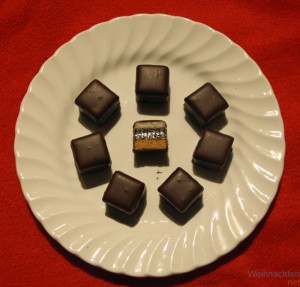 The word Dominostein is used to describe a small baked sweet that is eaten at Christmas time in Germany. It is made up of two or three layers, the base being Lebkuchen, the middle fruit jelly, and the top layer marzipan or persipan. This is then covered in a thin chocolate coating.
The word Dominostein is used to describe a small baked sweet that is eaten at Christmas time in Germany. It is made up of two or three layers, the base being Lebkuchen, the middle fruit jelly, and the top layer marzipan or persipan. This is then covered in a thin chocolate coating.
Dominosteine are a relatively recent invention. They were created in Dresden in 1936 and were popular during the Second World War as a form of sweet due to the small amounts of ingredients needed to make them.
To hear a simple explanation and a short discussion in German, listen to the podcast:
(Press the “play” button to listen to the podcast)



